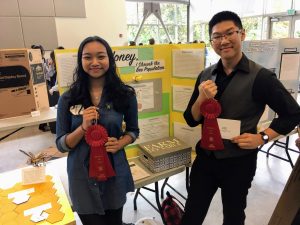Introduction
Project Description
Since pollinators play a key role in agriculture and maintaining biodiversity, this research project explored economically and environmentally sustainable solutions to Colony Collapse Disorder (CCD) of Apis mellifera. Research looked at causes of CCD, such as crop monocultures, pesticides, parasites, and pathogens and solutions, including artificial honey, alternatives to crop monocultures and pesticides, and RNA-modified honey bees that would be resistant to parasites and pathogens.
Project received 2nd Place in SMART Teams Category out of 80+ teams in 2018 Northwest Association for Biomedical Research Bio Expo
Book cover photo by Jonathan Kwong, 2020.
Vocabulary

- Colony Collapse Disorder (CCD): An occurrence where a honey bee hive faces a significant decrease in the number of worker bees
- United States Environmental Protection Agency (EPA): A group dedicated to protecting the environment and reducing pollution
- Deformed Wing Virus (DWV): A disease that impairs honey bee wings and flight
- Varroa Sensitive Hygiene (VSH): A behavior in honey bees in which they can identify mite presence in brood and remove the mites
Acknowledgements
- Penny Lefavour
- Janis Shin
- James Wilson
- Mark Burbank
- Randall Ritter
- Craig DeVine
- Eric Patno

